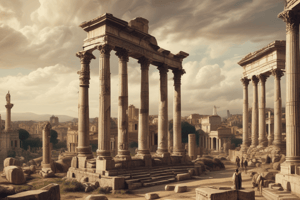Podcast
Questions and Answers
What is the primary focus of the colloquium preparation?
What is the primary focus of the colloquium preparation?
- Designing visually appealing slides and presentations
- Improving technical jargon and terminology
- Developing a thorough understanding of the bachelor thesis (correct)
- Mastering presentation skills
Why is it important to review the bachelor thesis shortly before the colloquium?
Why is it important to review the bachelor thesis shortly before the colloquium?
- To refresh forgotten background knowledge (correct)
- To translate it into another language
- To redo the thesis in a shorter format
- To submit it to the supervisor for feedback
What can help in preparing for discussion questions in the colloquium?
What can help in preparing for discussion questions in the colloquium?
- Reading the thesis multiple times
- Practicing presentation skills in front of a mirror
- Formulating answers to likely questions (correct)
- Conducting additional research on the topic
What should be readily available during the colloquium?
What should be readily available during the colloquium?
Why is it advisable to review topic-specific terms and keywords before the colloquium?
Why is it advisable to review topic-specific terms and keywords before the colloquium?
What is recommended to avoid possible misunderstandings regarding the colloquium?
What is recommended to avoid possible misunderstandings regarding the colloquium?
What can be done to ensure a clear presentation during the colloquium?
What can be done to ensure a clear presentation during the colloquium?
Where can further information regarding the colloquium be found?
Where can further information regarding the colloquium be found?
What is the primary objective of the colloquium?
What is the primary objective of the colloquium?
What is the significance of the colloquium in the context of a bachelor program?
What is the significance of the colloquium in the context of a bachelor program?
How does the colloquium differ from traditional oral exams?
How does the colloquium differ from traditional oral exams?
Why do Simon and Maike practice their colloquium presentations with each other?
Why do Simon and Maike practice their colloquium presentations with each other?
What does the use of a red card during the colloquium signify?
What does the use of a red card during the colloquium signify?
What is the primary goal of the examiners during the colloquium?
What is the primary goal of the examiners during the colloquium?
What is the most important aspect of the colloquium for the students?
What is the most important aspect of the colloquium for the students?
What is a key expectation of the examiners in relation to the students' research?
What is a key expectation of the examiners in relation to the students' research?
What is the primary purpose of the colloquium?
What is the primary purpose of the colloquium?
Which format is recommended for the presentation during the colloquium?
Which format is recommended for the presentation during the colloquium?
Which of the following is NOT a criterion for evaluating the colloquium?
Which of the following is NOT a criterion for evaluating the colloquium?
What should the structure of the presentation typically include?
What should the structure of the presentation typically include?
How long is the presentation portion of the colloquium expected to last?
How long is the presentation portion of the colloquium expected to last?
What is the first component of the colloquium?
What is the first component of the colloquium?
Why is it recommended to consult the supervisor before the colloquium?
Why is it recommended to consult the supervisor before the colloquium?
During the question-and-answer session, students are primarily expected to...
During the question-and-answer session, students are primarily expected to...
After the colloquium, what happens after the student leaves the room?
After the colloquium, what happens after the student leaves the room?
Which of the following aspects is assessed during the colloquium?
Which of the following aspects is assessed during the colloquium?
Flashcards are hidden until you start studying
Study Notes
The Colloquium at IU
- The colloquium is a performance review that occurs at the end of the bachelor program, marking the end of several years of intensive study on various subjects.
- It has two major components: presentation of the written work and discussion of the contents with the examiners.
Objectives and Procedure
- The colloquium takes place after the submission and positive assessment of the bachelor thesis, serving as proof that the written thesis has been completed in full.
- The invitation to the colloquium is issued by the examiner of the bachelor thesis and is a sure sign that the bachelor thesis has been passed.
- The colloquium will be held either at a study site of IU or online, independent of location.
- After the approximately 30-minute colloquium, the student is asked to leave the (virtual) room briefly, and the examiners discuss and agree upon their evaluation.
Presentation
- The presentation should show the whole research process, starting with the research question and finishing with the conclusion.
- The presentation should last around 15 minutes and should follow the typical three-part structure: introduction, body, and conclusion.
- The content should be both intellectually demanding and plausible and understandable.
- It is important to emphasize the innovative points of the written explanation and to only briefly refer to the starting point of the work.
Discussion
- The subsequent question-and-answer session aims to defend both the bachelor thesis and the presentation.
- The primary purpose of a defense is to provide adequate linguistic and content-related justification for what has been said or written and for the conclusion reached.
Evaluation Criteria
- Both components of the colloquium will be assessed on an interdisciplinary basis using the following four criteria:
- Understanding and applying scientific analytical methods
- Structure and content of the presentation
- Ability to defend the bachelor thesis academically
- Content and logical consistency of answers to exam questions
Notes for Preparation
- Determine and implement your own preferences for supporting visuals.
- Keep in mind your own individual work and refresh any forgotten background knowledge.
- Prepare discussions by thinking about likely questions and formulating answers.
- Have "standard work" (the written bachelor thesis) at the ready and within reach during the colloquium.
- Use technical jargon and review topic-specific terms, keywords, and name experts in the field.
- Consult with your supervisor to avoid possible misunderstandings and practice the presentation as often as possible.
Studying That Suits You
Use AI to generate personalized quizzes and flashcards to suit your learning preferences.





